Songs Of Innocence And Experience
[Mojo, November 2005. Words: Danny Eccleston. Pictures: Steve Gullick.]
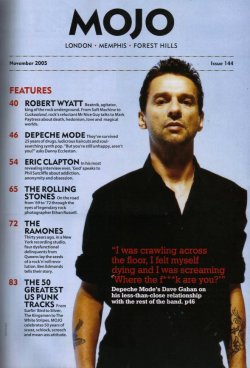
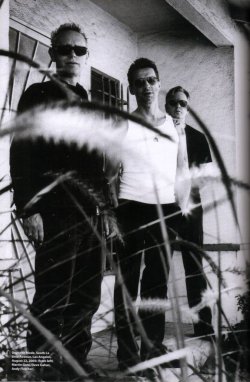
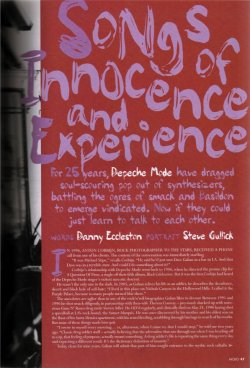
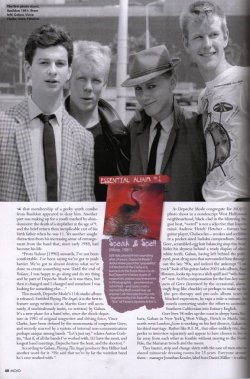
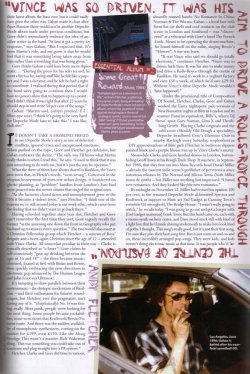
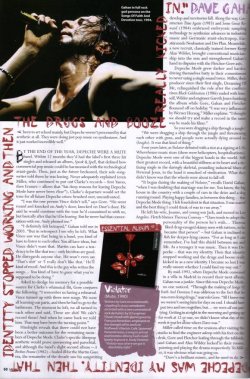
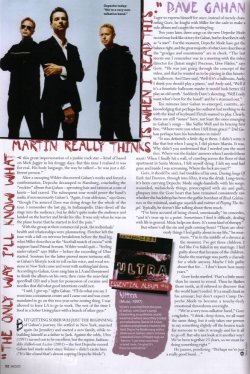
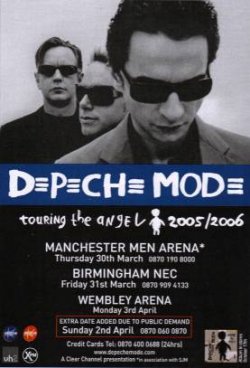
For 25 years, Depeche Mode have dragged soul-scouring pop out of synthesizers, battling the ogres of smack and Basildon to emerge vindicated. Now if they could just learn to talk to each other.
In 1996, Anton Corbijn, rock photographer to the stars, received a phone call from one of his clients. The content of the conversation was immediately startling.
“It was Michael Stipe,” recalls Corbijn. “He said he’d just met Dave Gahan in a bar in L.A. And that Dave was in a terrible state. And could I do something about it?”
Corbijn’s relationship with Depeche Mode went back to 1986, when he directed the promo clip for A Question Of Time, a single off their fifth album, Black Celebration. But it was the first Corbijn had heard of the Depeche Mode singer’s violent narcotic descent.
He wasn’t the only one in the dark. In 2005, as Gahan relives his life as an addict, he describes the decadence, deceit and black hole of self-hate: “I lived in this place on Nichols Canyon in the Hollywood Hills. I called it the Purple Palace, because so many people turned blue there.”
The anecdotes are uglier than in any of the rock’n’roll biographies Gahan likes to devour. Between 1991 and 1996 he shot smack diligently, in partnership with then-wife Theresa Conway – previously shacked up with notorious Guns N’ Roses drug mule Steven Adler. He OD’d regularly, and clinically died on May 28, 1996 having shot a speedball at LA’s rock hostel, the Sunset Marquis. He was once discovered by his mother and eldest son on the floor of his Santa Monica apartment, with his arms bleeding, scrabbling through bin bags in search of his works. But none of these things made him quit.
“I swore to myself every morning… er, afternoon, when I came to, that I would stop,” he told me two years ago. “Classic drug addict stuff – actually believing that the adrenaline that ran through me when I was heading off to cop, that feeling of purpose, actually meant something. A drug addict’s life is repeating the same thing every day and expecting a different result. It’s the dictionary definition of insanity.”
Today, clean for nine years, Gahan will admit that part of him sought entrance to the mythic rock valhalla that membership of a geeky synth combo from Basildon appeared to deny him. Another part was making up for a youth marked by abandonment: the death of a stepfather at the age of 9, and the brief return then inexplicable exit of his birth father when he was 11. Yet another sought distraction from his increasing sense of estrangement from the band that, since early 1980, had become his life.
“From Violator [1990] onwards, I’ve not been comfortable. I’ve been saying we’ve got to push harder. We’ve got to almost destroy what we’ve done to create something new. Until the end of Violator, I was happy to go along and do my thing and be part of Depeche Mode as it was then, but then it changed and I changed and somehow I was looking for something else…”
This month, Depeche Mode’s 11th studio album is released. Titled Playing The Angel, it is the first to feature songs written (or as Martin Gore will accurately, if unchivalrously, insist, co-written) by Gahan. It’s a new phase for a band who, since the shock departure in 1981 of original songwriter and driving force, Vince Clarke, have been defined by the monomania of songwriter Gore, and secretly scarred by a system of internal non-communication perhaps unique among bands. “Let’s just say,” relates Anton Corbijn, “that if, of all the bands I’ve worked with, U2 have the most, and longest band meetings, Depeche have the least, and the shortest.”
According to Gahan, Playing The Angel producer Ben Hillier had another word for it. “He said that we’re by far the weirdest band he’s ever worked with.”
As Depeche Mode congregate for MOJO’s photo shoot in a nondescript West Hollywood neighbourhood, black-clad in the blistering August heat, “weird” is not an adjective that leaps to mind. Andrew ‘Fletch’ Fletcher – former bass guitar player, Chelsea fan – smokes and scribbles in a pocket-sized Sudoku compendium. Martin Gore, scrambled-egg hair balancing atop tiny head, hides his shyness between a ready display of ultra-white teeth. Gahan, having left behind the puffy-eyed, post-drug aura that surrounded him throughout the late ‘90s, and indeed the unkempt “I am rock” look of his guitar-laden 2003 solo album, Paper Monsters, looks tip-top in a slick quiff and “wife-beater” vest. As if in compensation for the low-key wariness of Gore (leavened by the occasional, alarmingly frog-like chuckle) or perhaps to make up for the pre-therapy and pre-solo album years of blocked expression, he raps a mile-a-minute, his vowels contorting under the effort to assimilate Southern Californian into Estuary English.
Gore lives 78 miles up the coast in sleepy Santa Barbara, Gahan in New York’s West Village, Fletch in Maida Vale, north-west London. Gore is working on his first divorce, Gahan on his third marriage. Rather like R.E.M., that other unlikely trio, they prefer to interview separately and appear to have chosen to live as far away from each other as feasible without moving to the North Pole, the Marianas Trench and the moon.
[Mojo, November 2005. Words: Danny Eccleston. Pictures: Steve Gullick.]
A near-faultless long article - with plenty of direct comment from the band - covering the entire history of Depeche Mode. The writer looks at the band through the filter of their inhibitions and flaws, but never losing sight of the bigger picture. It's a shame the author focuses more on the early years and Devotional myth: had he had space to turn his attentions equally to other years, this would have been a masterpiece.
" Rather like R.E.M., that other unlikely trio, they prefer to interview separately and appear to have chosen to live as far away from each other as feasible without moving to the North Pole, the Marianas Trench and the moon. "








For 25 years, Depeche Mode have dragged soul-scouring pop out of synthesizers, battling the ogres of smack and Basildon to emerge vindicated. Now if they could just learn to talk to each other.
In 1996, Anton Corbijn, rock photographer to the stars, received a phone call from one of his clients. The content of the conversation was immediately startling.
“It was Michael Stipe,” recalls Corbijn. “He said he’d just met Dave Gahan in a bar in L.A. And that Dave was in a terrible state. And could I do something about it?”
Corbijn’s relationship with Depeche Mode went back to 1986, when he directed the promo clip for A Question Of Time, a single off their fifth album, Black Celebration. But it was the first Corbijn had heard of the Depeche Mode singer’s violent narcotic descent.
He wasn’t the only one in the dark. In 2005, as Gahan relives his life as an addict, he describes the decadence, deceit and black hole of self-hate: “I lived in this place on Nichols Canyon in the Hollywood Hills. I called it the Purple Palace, because so many people turned blue there.”
The anecdotes are uglier than in any of the rock’n’roll biographies Gahan likes to devour. Between 1991 and 1996 he shot smack diligently, in partnership with then-wife Theresa Conway – previously shacked up with notorious Guns N’ Roses drug mule Steven Adler. He OD’d regularly, and clinically died on May 28, 1996 having shot a speedball at LA’s rock hostel, the Sunset Marquis. He was once discovered by his mother and eldest son on the floor of his Santa Monica apartment, with his arms bleeding, scrabbling through bin bags in search of his works. But none of these things made him quit.
“I swore to myself every morning… er, afternoon, when I came to, that I would stop,” he told me two years ago. “Classic drug addict stuff – actually believing that the adrenaline that ran through me when I was heading off to cop, that feeling of purpose, actually meant something. A drug addict’s life is repeating the same thing every day and expecting a different result. It’s the dictionary definition of insanity.”
Today, clean for nine years, Gahan will admit that part of him sought entrance to the mythic rock valhalla that membership of a geeky synth combo from Basildon appeared to deny him. Another part was making up for a youth marked by abandonment: the death of a stepfather at the age of 9, and the brief return then inexplicable exit of his birth father when he was 11. Yet another sought distraction from his increasing sense of estrangement from the band that, since early 1980, had become his life.
“From Violator [1990] onwards, I’ve not been comfortable. I’ve been saying we’ve got to push harder. We’ve got to almost destroy what we’ve done to create something new. Until the end of Violator, I was happy to go along and do my thing and be part of Depeche Mode as it was then, but then it changed and I changed and somehow I was looking for something else…”
This month, Depeche Mode’s 11th studio album is released. Titled Playing The Angel, it is the first to feature songs written (or as Martin Gore will accurately, if unchivalrously, insist, co-written) by Gahan. It’s a new phase for a band who, since the shock departure in 1981 of original songwriter and driving force, Vince Clarke, have been defined by the monomania of songwriter Gore, and secretly scarred by a system of internal non-communication perhaps unique among bands. “Let’s just say,” relates Anton Corbijn, “that if, of all the bands I’ve worked with, U2 have the most, and longest band meetings, Depeche have the least, and the shortest.”
According to Gahan, Playing The Angel producer Ben Hillier had another word for it. “He said that we’re by far the weirdest band he’s ever worked with.”
As Depeche Mode congregate for MOJO’s photo shoot in a nondescript West Hollywood neighbourhood, black-clad in the blistering August heat, “weird” is not an adjective that leaps to mind. Andrew ‘Fletch’ Fletcher – former bass guitar player, Chelsea fan – smokes and scribbles in a pocket-sized Sudoku compendium. Martin Gore, scrambled-egg hair balancing atop tiny head, hides his shyness between a ready display of ultra-white teeth. Gahan, having left behind the puffy-eyed, post-drug aura that surrounded him throughout the late ‘90s, and indeed the unkempt “I am rock” look of his guitar-laden 2003 solo album, Paper Monsters, looks tip-top in a slick quiff and “wife-beater” vest. As if in compensation for the low-key wariness of Gore (leavened by the occasional, alarmingly frog-like chuckle) or perhaps to make up for the pre-therapy and pre-solo album years of blocked expression, he raps a mile-a-minute, his vowels contorting under the effort to assimilate Southern Californian into Estuary English.
Gore lives 78 miles up the coast in sleepy Santa Barbara, Gahan in New York’s West Village, Fletch in Maida Vale, north-west London. Gore is working on his first divorce, Gahan on his third marriage. Rather like R.E.M., that other unlikely trio, they prefer to interview separately and appear to have chosen to live as far away from each other as feasible without moving to the North Pole, the Marianas Trench and the moon.
